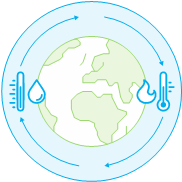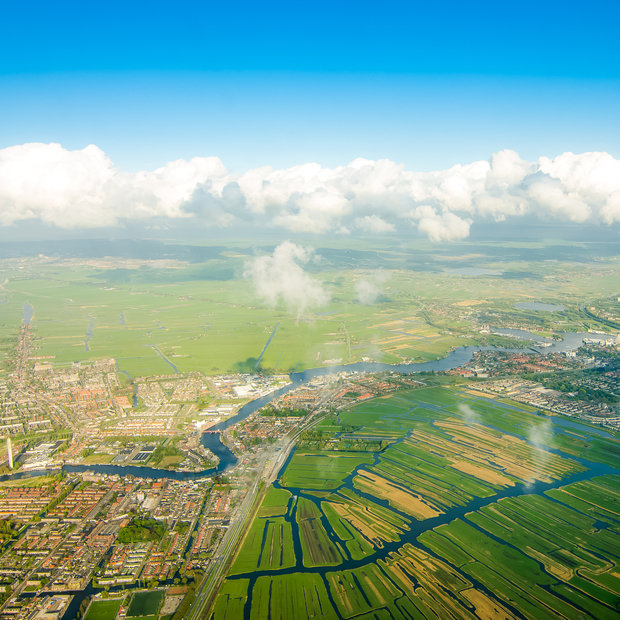Theme III: Climate change adaptation
Higher temperatures, droughts, sea level rise, extreme precipitation and storms: we increasingly experience the impact of climate change. Without sufficient mitigation measures, humanity and nature will increasingly be affected by climate change, so adaptation to these changes will be a dire need. Many areas in the world are already at great risk of flooding: at the coast, near rivers and in urbanised areas, due to heavy rainfall. This risk will increase in the future and it will not be evenly distributed, also strongly due to economic and population growth.
The urban heat island effect is aggravated by climate change. With European cities going well beyond 40 degrees in summer, more strategies are needed that can significantly cool the city and simultaneously support the sustainable energy transition. And with sea levels projected to rise beyond 1 metre, more severe measures might be needed, in the form of spatial planning in flood-prone areas and serious water retention strategies. In two flagship programmes we address these issues.
To manage climate change risks it is essential to coherently look at coastal protection, river discharge, water management, salt intrusion, urbanisation and the governance thereof. This will lead to drastic spatial planning interventions, new resilient infrastructures and nature-based adaptation techniques, as well as measures for implementation, awareness and empowerment.

Flagship project
Cool and Clean Buildings

Rising outdoor air temperatures and more intensified heatwaves are increasing the overheating risk inside buildings. Furthermore, increased humidity and smog events threaten indoor air quality. This leads to an increased energy demand for cooling and ventilation, but also to increased heat stress, health problems and mortality, especially among elderly and people with a weaker health. It is therefore imperative that our buildings where people spend nearly 90% of their time are prepared for this. This flagship focusses on sustainable building and climate adaptation strategies, to respond to temperature and air quality-driven impacts, enacting the European renovation challenge of existing buildings. It revolves around three integrated perspectives: (1) technology for cool and clean buildings, (2) humans and their health, behaviour and wellbeing, and (3) integrated and holistic design.
Flagship team
Philomena Bluyssen
Martin Tenpierik
Marc Ottelé
Roberto Cavallo
Olindo Isabella
AnneMarie Eijkelenboom (Academic Career Tracker)
Flagship project
Sponge Cities

The current potential of urban water management systems to remove rainwater is not sufficient to deal with the large rainfall events that occur as a result of climate change. At the same time, climate change causes cities to suffer from drought during increasingly long hot periods, resulting in declining groundwater tables that pose a threat to building foundations. The Sponge Cities approach is a response to this challenge: allowing for storing enough water to face droughts (keep the sponge wet enough), while being able to store excess rainwater when needed (keep the sponge dry enough). Moreover, Sponge Cities need to provide urban spaces that are lively, safe and supporting the health and well-being of humans and ecosystems in the face of amplifying disturbances of environmental, social and economic kind. This requires new innovative solutions and control systems to store and manage water in urban areas and integrate these solutions in the current built environment, while producing co-benefits in terms of ecosystem services and spatial quality. Thus, implementing the Sponge Cities approach requires working at the intersection between water management, spatial planning and urban design.
Flagship team
Claudiu Forgaci
Mark Bakker
Marcin Dabrowski
Boris van Breukelen
Martine Rutten
Thaleia Konstantinou
Taneha Kuzniecow Bacchin
Arjan van Timmeren
Zoran Kapelan
Jeroen Langeveld
Maryam Naghibi
Aditi Natarajan PhD
Juliana Goncalves (Academic Career Tracker)
Flagship project
Cooling Cities

Climate change leads to an amplification of heat in cities, including the intensity and duration of heat waves. The impacts of urban heat are manifold, ranging from increased morbidity and mortality, decreased air quality, altered water cycles, energy blackouts, and dysfunctional rail, road, quays and bridge infrastructures. High-resolution urban hydrometeorological models will be crucial to assess the impact of adaptation plans in the cities of the future.We will develop and employ a fully-integrated observation-modelling program, with the objective of assessing the effectivity of urban planning and design strategies (e.g., green, blue, and sustainable solutions) in improving the urban living environment, both indoor as well as outdoor.
Flagship team
Remko Uijlenhoet
Stephan de Roode
Miriam Coender
Clara García-Sánchez
Marjolein van Esch,
René van der Velde
Kofi Makinwa
Gerben Mol
Arjan Droste (Academic Career Tracker)
Flagship project
Spatial Planning of Future Deltaic Systems

Climate change exacerbates both the frequency and severity of floods, storms, and droughts in deltaic water systems, where the coastal, riverine and regional/urban water systems co-evolve and interact with spatial development patterns. This flagship focuses on improving the understanding of these systems and their interactions, including the urbanized landscape and infrastructure, under climate change. The focus is on an integrated and interdisciplinary approach to three challenges: (1) combining data and modeling tools, (2) developing adaptive design methods and insight in interventions, including nature-based solutions for adaptation and territorial/land-use planning, (3) supporting multi-actor decision making and management through multi-objective optimization and evaluation of specific strategies and interventions, both for operational use (real-time, early warning) and long-term planning, under deep uncertainty.
